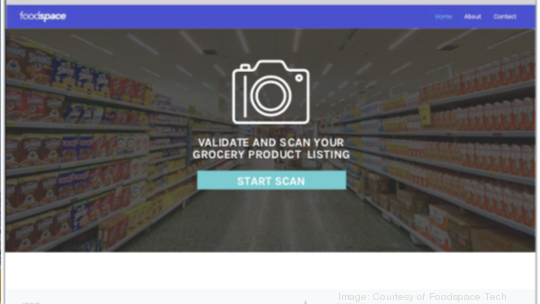
When Ayo Oshinaike and his co-founders first imagined their foodtech startup, they conceived its product as one that would first and foremost help consumers plan meals and understand their personal nutrition.
Oshinaike launched his startup's first iteration, a consumer app called Lunchbox, when he was still a student at Northeastern University. Lunchbox eventually merged with another startup called Nutrition Algorithm to become what is now Foodspace Tech.
Foodspace made its first debut about a year ago with a consumer-focused app, similar to Lunchbox's, that was designed to help people to take control of their nutritional choices.
“Our goal at our company was always to improve nutrition and figure out new ways to make sure we’re being sustainable and helping people eat the meals they want to,” said Oshinaike, who heads up Foodspace as CEO. “We wanted to have a larger impact.”
Foodspace gained access to an audience of about 40,000 within its first few months of existence. Around that time, Oshinaike and his co-founders, CTO Daniel DeMillard, COO Daniel Yaghsizian and CMO Montana Fredrick, were at a grocery retail conference called Groceryshop, where they began thinking about how their technology could be tailored to major retailers like Target and Walmart. Their product had AI and machine -earning capabilities, and they wanted to fine-tune those. As it turned out, Foodspace could offer something major: a way for retailers to quickly digitize data about individual food products.
“The first thing you want to understand [as a big-box retailer] is the ground-truth data about those products,” Oshinaike said. “They don’t have the information in a digital way that they can go about understanding the components of the product.”
Foodspace pivoted from a B2C to B2B model with the aim of providing detailed metadata about grocery products for retailers’ e-commerce sites. Take, for example, a jar of alfredo sauce. Using AI and machine learning, Foodspace’s technology can “look” at a photo or video of the jar’s label and quickly catalog data, including brand name, product name, net weight, nutritional information, ingredients, Universal Product Code, packaging type and diet categorization.
But the technology goes a step beyond. Foodspace will also make note of the fact that alfredo sauce is milk-based, so it should not be suggested to a lactose-intolerant customer shopping for groceries online. It is the ability to capture those details, Oshinaike said, that makes Foodspace stand out.

Foodspace’s quick scanning is also a time-saver for its business clients. Traditionally, when a retailer begins stocking a new product, it sends that product to a third-party service where humans will digitize its information by hand. Oshinaike estimates that process takes about 25 minutes per product, plus shipping back and forth. Foodspace can digitize product information in less than a second.
Since pivoting, Foodspace has begun working with clients including Walmart, Nielsen, Nestle, Panera and Mars, as well as Sifter, a Chicago startup co-founded by Peapod founder Andrew Parkinson.
“They quickly digitize their information and bring it to their retail partners,” Oshinaike said. “It’s nice to see the industry is understanding and working with the technology and focusing on the accuracy and information online. Realistically, the [food retail] space was not ready to have this many people online. With Covid-19, we’re seeing 300 percent more online orders happening, and 60 percent of clients’ business is happening online.”
Foodspace has participated in Northeastern's IDEA venture accelerator, Cleantech Open and the Consumer Goods Forum since launching.
For Oshinaike, although Foodspace is now a B2B startup rather than its original B2C plan, the end goal is still the same: to empower consumers with the information they need to make good food choices.
"That's something always in our mind," Oshinaike said. "We have our brand partners and retailer partners, but who are we really serving? The ground-truth data is for the customers."



